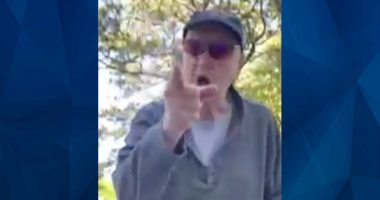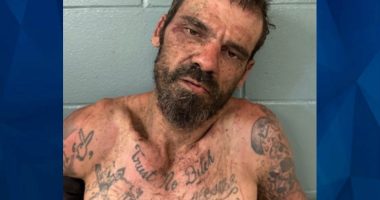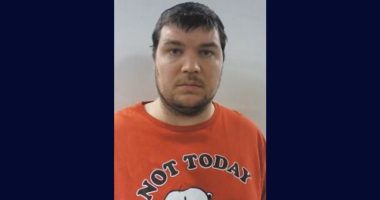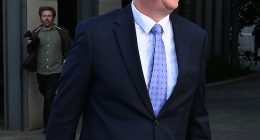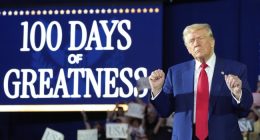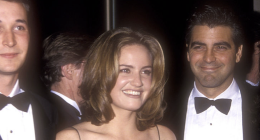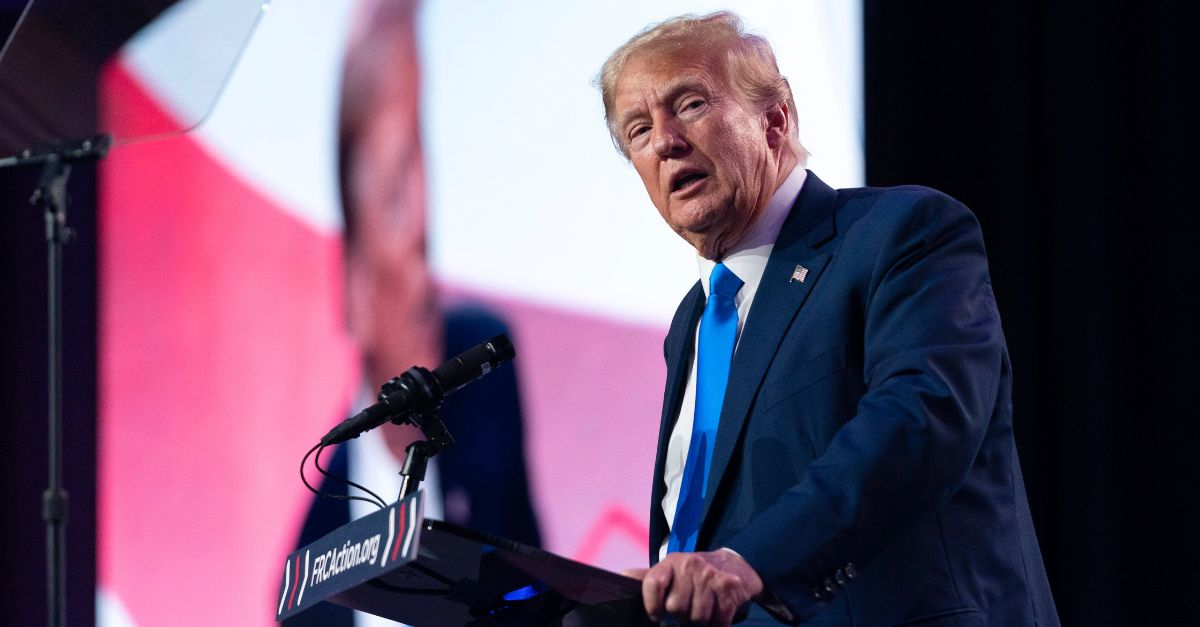
Former President Donald Trump speaks during the Pray Vote Stand Summit, Friday, Sept. 15, 2023, in Washington. (AP Photo/Jose Luis Magana, File)
In his ongoing bid to have U.S. District Judge Tanya Chutkan thrown off his case in Washington, D.C., where he faces multiple felony charges tied to efforts to subvert the 2020 election, former President Donald Trump alleged in a filing late Sunday a new series of thinly-supported claims that the judge has demonstrated “disqualifying” prejudice against him.
The 11-page filing from Trump attorneys John Lauro and Todd Blanche — a reply to the federal government’s opposition to the recusal request — reiterates much of what they said in a filing last week, in that it features assertions that Chutkan spoke improperly and had expressed bias indicating she believed he was guilty while sentencing two Jan. 6 rioters, Robert Palmer and Christine Priola. The judge had referenced Trump when she remarked to Priola, who pleaded guilty to obstructing an official proceeding, that those who mobbed the Capitol on Jan. 6 were there in “fealty” to one man and that they had “blind loyalty to one person, who, by the way remains free to this day.”
“Judge Chutkan’s statements point to the unmistakable conclusion that the appearance of prejudgment will infect every aspect of this case and cause the public to rightly question the very legitimacy of these historic proceedings,” Trump’s lawyers wrote in Sunday’s filing.
Urging the court to reject the motion to recuse, special counsel Jack Smith had argued Chutkan’s comments were perfectly ordinary in the course of sentencing, and particularly so when discussing details of a case with a defendant who had specifically put the blame on Trump for their own actions. Not only were Chutkan’s statements factually accurate and “intrajudicial,” special counsel said, even the judge herself told the defendants her opinion on who should or should not be charged were irrelevant.
Nonetheless, Trump argues even this remark is evidence of her blatant prejudice.
Interestingly, and somewhat bizarrely, the former president’s defense attorneys added the new claim that when Priola was sentenced and Chutkan remarked that Trump “remained free to this day,” Chutkan had made these comments in the course of reviewing “unspecified videotapes” and “footage” that the prosecution had not yet established in evidence or did not “appear not to be.”
But when Priola was sentenced, federal prosecutors did submit a number of exhibits featuring video footage to support its case. That included those, necessarily, where Priola could be seen in the mob carrying a pro-Trump sign as she moves about, chanting with people declaring “Who’s our President? Trump!” and “Defend your Constitution!”
Priola was sentenced to 15 months on October 28, 2022 and by that time, Chutkan had not only reviewed video footage involving Priola, but countless other hours of footage in the course of her official duties presiding over Jan. 6 cases
Lauro did not immediately return a request for comment to Law&Crime on Monday.
“These proceedings are indeed historic. The public interest is not in the perception of a rush to judgement or a trial contaminated by the appearance of a partial presiding judge, but in a fair proceeding guaranteeing fundamental human and constitutional rights,” Lauro and Blanche wrote in the filing. “Anything less will rightly call into question the very legitimacy of these proceedings and cause irreparable damage to our judicial system for generations to come. The public must have confidence that the President Trump’s constitutional rights are being protected by an unbiased judicial officer. No president is a king but every president is a United States citizen entitled to the protections and rights guaranteed by the U.S. Constitution.”
The “no president is a king” mention is a line used by Chutkan when handling Jan. 6 cases, and specifically, Trump’s. In August 2021, Chutkan denied a motion from Trump seeking to invoke executive privilege and block call logs and other records requested by the House Select Committee to Investigate the Jan. 6 Attack on the U.S. Capitol.
Read Related Also: Winners of CrimeCon’s 2023 CLUE Awards Announced (Exclusive)
“Presidents are not kings, and Plaintiff is not President,” Chutkan wrote.
The line is also a nod to a ruling from U.S. Supreme Court Justice Kentanji Brown Jackson when she served as a district judge in Washington, D.C., and issued an opinion involving former White House counsel under Trump, Don McGahn. McGahn unsuccessfully sought to avoid testifying before the House of Representatives about Trump’s alleged abuses of power and obstruction of Congress.
During her Supreme Court confirmation hearings, Jackson explained what she meant to the Senate Judiciary Committee:
“Our constitutional scheme, the design of our government is erected to prevent tyranny. The framers decided, after experiencing monarchy, tyranny, and the like, that they were going to create a government that would split the powers of a monarch in several different ways. One was federalism. It was vertical, they would split the powers between the federal government and states. Another was to prevent the federal government from itself becoming too powerful, from having all of the authorities, from having legislative, executive and judicial authority concentrated in one place,” she said.
Ultimately, it will be up to Chutkan to issue her own recusal, and it is exceedingly unlikely that she would do so since the bar to order it is very steep and narrow and requires sound factual basis.
The motion from Trump also comes as special counsel has requested that Chutkan establish additional limits on Trump’s running public commentary on his case in the nation’s capital due to concerns that he will taint the prospective jury pool and potentially intimidate witnesses.
That filing cites how Trump has attacked prosecutors and the special counsel’s office on social media, misrepresented details of the investigations into his alleged criminal conduct in South Florida and actively promotes the conspiracy theory that federal prosecutors conspired with the Biden administration to engage in election interference in 2024 by indicting him in 2023.
That last particular falsehood, prosecutors argued, is a “knowing lie” by Trump involving special counsel prosecutor Jay Bratt. Bratt did visit the White House around the time of Trump’s indictment but it was because he was conducting a routine interview of a military official working there.
Historically, Trump’s attacks on individuals that he lashes out at publicly have led to death threats for many, including Georgia election workers Ruby Freeman and ArShaye Moss, former cybersecurity director to Trump Chris Krebs and Geoff Duncan, the former lieutenant governor of Georgia.
Chutkan has not responded to the request to enforce a partial gag order on Trump as of Monday morning though she did tell his attorneys during a hearing on Aug. 11 that if the former continued to make inflammatory remarks about his case, “safeguards” would be put in place to ensure the integrity of proceedings.
Have a tip we should know? [email protected]


